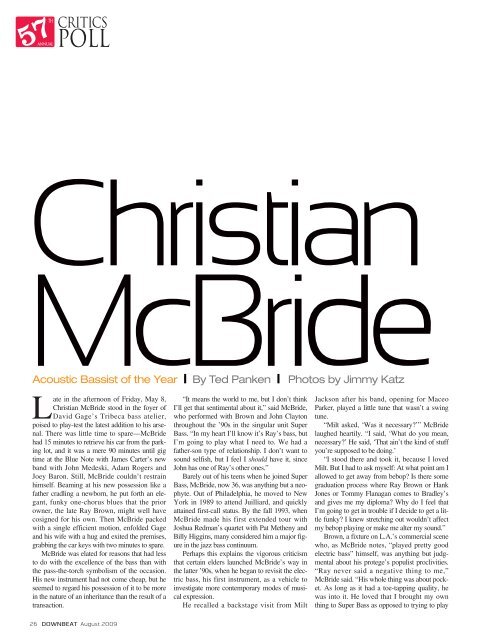Download - Downbeat
Download - Downbeat
Download - Downbeat
- No tags were found...
Create successful ePaper yourself
Turn your PDF publications into a flip-book with our unique Google optimized e-Paper software.
57ChristianMcBrideAcoustic Bassist of the Year | By Ted Panken | Photos by Jimmy KatzLate in the afternoon of Friday, May 8,Christian McBride stood in the foyer ofDavid Gage’s Tribeca bass atelier,poised to play-test the latest addition to his arsenal.There was little time to spare—McBridehad 15 minutes to retrieve his car from the parkinglot, and it was a mere 90 minutes until gigtime at the Blue Note with James Carter’s newband with John Medeski, Adam Rogers andJoey Baron. Still, McBride couldn’t restrainhimself. Beaming at his new possession like afather cradling a newborn, he put forth an elegant,funky one-chorus blues that the priorowner, the late Ray Brown, might well havecosigned for his own. Then McBride packedwith a single efficient motion, enfolded Gageand his wife with a hug and exited the premises,grabbing the car keys with two minutes to spare.McBride was elated for reasons that had lessto do with the excellence of the bass than withthe pass-the-torch symbolism of the occasion.His new instrument had not come cheap, but heseemed to regard his possession of it to be morein the nature of an inheritance than the result of atransaction.“It means the world to me, but I don’t thinkI’ll get that sentimental about it,” said McBride,who performed with Brown and John Claytonthroughout the ’90s in the singular unit SuperBass. “In my heart I’ll know it’s Ray’s bass, butI’m going to play what I need to. We had afather-son type of relationship. I don’t want tosound selfish, but I feel I should have it, sinceJohn has one of Ray’s other ones.”Barely out of his teens when he joined SuperBass, McBride, now 36, was anything but a neophyte.Out of Philadelphia, he moved to NewYork in 1989 to attend Juilliard, and quicklyattained first-call status. By the fall 1993, whenMcBride made his first extended tour withJoshua Redman’s quartet with Pat Metheny andBilly Higgins, many considered him a major figurein the jazz bass continuum.Perhaps this explains the vigorous criticismthat certain elders launched McBride’s way inthe latter ’90s, when he began to revisit the electricbass, his first instrument, as a vehicle toinvestigate more contemporary modes of musicalexpression.He recalled a backstage visit from MiltJackson after his band, opening for MaceoParker, played a little tune that wasn’t a swingtune.“Milt asked, ‘Was it necessary?’” McBridelaughed heartily. “I said, ‘What do you mean,necessary?’ He said, ‘That ain’t the kind of stuffyou’re supposed to be doing.’“I stood there and took it, because I lovedMilt. But I had to ask myself: At what point am Iallowed to get away from bebop? Is there somegraduation process where Ray Brown or HankJones or Tommy Flanagan comes to Bradley’sand gives me my diploma? Why do I feel thatI’m going to get in trouble if I decide to get a littlefunky? I knew stretching out wouldn’t affectmy bebop playing or make me alter my sound.”Brown, a fixture on L.A.’s commercial scenewho, as McBride notes, “played pretty goodelectric bass” himself, was anything but judgmentalabout his protege’s populist proclivities.“Ray never said a negative thing to me,”McBride said. “His whole thing was about pocket.As long as it had a toe-tapping quality, hewas into it. He loved that I brought my ownthing to Super Bass as opposed to trying to play26 DOWNBEAT August 2009
















